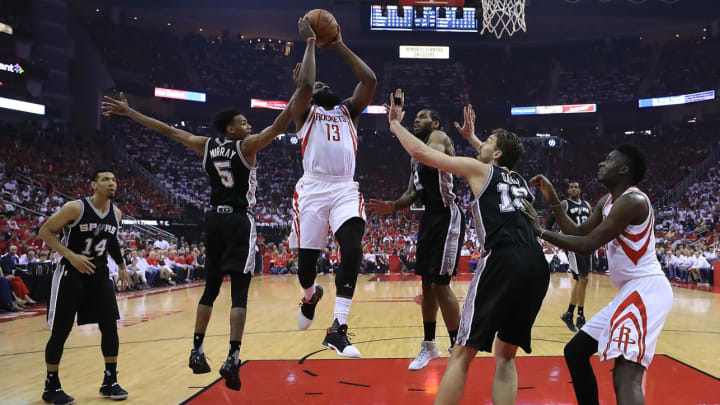The Spurs Are Disrupting The Fluidity Of The Rockets' Offense

HOUSTON –– The health of the Rockets’ offense is told by what comes of their passing. Shot selection is hard-wired by this point. Houston knows what kinds of looks suit it best and will work tirelessly toward those ends. Ball movement is implicit in that, given that open three-pointers don’t tend to create themselves. So the drives come and the passes fly, with the success of a possession riding largely on precision. What appears smooth and simple can fluctuate wildly with the delivery of a pass or the variable, closing distance between shooter and defender.
That precious space became the battleground of Game 3. Marksmen like Ryan Anderson and Eric Gordon can fire off quality threes even when a pass lands outside their shooting pocket or with a defender rushing toward them. When a defense can unsettle both that placement and timing – while surviving the concessions that such a strategy requires – it can keep the Rockets at bay. Few teams have the personnel necessary to keep that balance. Even those that do might not have the discipline, given how enticing it is to crash down on every one of James Harden's drives. The Spurs get by. Their bigs may be slow of foot and their perimeter defenders left at Harden's mercy, but San Antonio's most convincing wins are victories of system.
Anderson, Gordon, Patrick Beverley, and Lou Williams struggled for Houston because the connective tissue of the offense itself was strained. Harden can generally pass his way out of trouble, but in too many cases on Friday he was forced to launch his passes between the arms of a recovering Kawhi Leonard and a rotating seven-footer, all while the defenders on the perimeter knew what was coming. "I think that's the way they are defending us," Beverley said. "Pau Gasol, he's long. LaMarcus Aldridge, he's long. They're trying to take away the alley oop from Nene and Clint [Capela], and that is the shot available."
San Antonio's deflections created stalls. Contested passing angles bought time for perimeter defenders to make up ground. Houston's most dangerous shooters were chased out of their comfort zone and inside the arc, a no man's land of more challenging attempts with a lower return. "They’re running us off and they’re doing a great job," Rockets coach Mike D'Antoni said. "We’ve gotta be able to either get it off quicker – well, we’ve gotta get in transition, as we said. We didn’t do that. We’ll look at it. We’ll try to get more. But again, we didn’t finish very well. They’re doing a good job of making us take floaters."
Tony Parker's Injury Doesn't Dash Spurs' Finals Hopes
Beverley and Gordon took those shots confidently, but failed to convert. Even a few more makes might have shifted the course of the game. Defenses thrive on feedback. They cover best when there's a sense that what they're doing is actually working, and against Houston that registers whenever a player like Gordon has to pass up a three to clang a runner. Gordon can make that shot, but the Rockets would prefer he never have to take it.
The Spurs forced their hand by challenging the very idea of fluid ball movement. Whenever possible, San Antonio sat on the next pass in sequence – rushing at a shooter to make him hesitate while cutting off the swing pass that might normally have led to an open shot. Even when those openings came, some clean looks felt as though they were out of rhythm.
Will The Rockets Pick-And-Roll The Spurs To Death?
"We’ve gotta drive and make the extra pass," D'Antoni said. "You’ve gotta get to the next guy. You’ve got to move the ball a little bit better. It’s been easy all year. The first shot’s there. Now it might be like the third pass and we’ve got to do a better job moving it."
Games can be won or lost in the space of that “third pass.” Reaching that kind of downhill fluency can transform good shots – the kind that could have won the game for the Rockets, had they not rimmed out – into better ones. Failing to made Harden’s 43 points on 28 shots a losing effort, sunk by how many of his connections to his teammates were challenged or closed off entirely.

Rob Mahoney is an NBA writer dedicated to the minutiae of the game of basketball, its overarching themes and everything in between. He joined the Sports Illustrated staff in 2012.